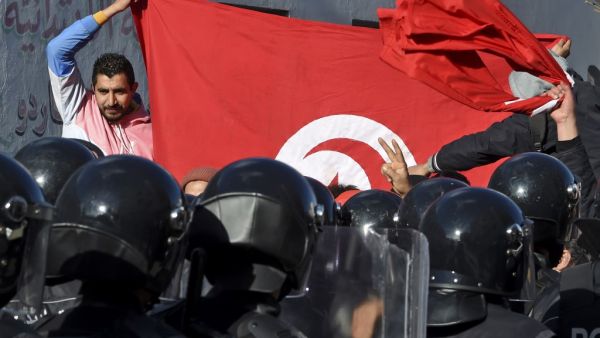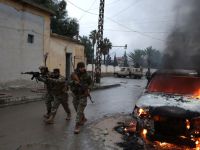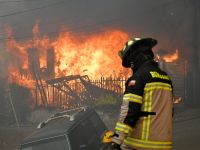Tunisian crowds marched on the heavily guarded parliament Tuesday as lawmakers plan to vote on a new government, after a week of youth protests and riots over poverty and lack of jobs that left one young demonstrator dead and hundreds jailed.
The parliament began the heated session to approve a major cabinet reshuffle, after the president criticised the line-up and as tensions in the country run high.
The session comes a day after protesters clashed with police in the town of Sbeitla, in Tunisia’s marginalised centre, after a young man hit by a tear gas canister during clashes last week died in hospital.
Protests erupted in Tunisia after the 10th anniversary of the Arab Spring revolution https://t.co/2RLYerjqJw pic.twitter.com/HwLZhrWWGv
— Reuters (@Reuters) January 19, 2021
Lawmakers criticised a heavy police deployment around the parliament building after calls for a rally there.
“A vote of confidence under police siege,” one said. “All that’s missing is to vote under the threat of the baton.
Legislator Ali Hermassi denounced the failure of four successive governments to improve the economy, noting that unemployment has risen, as has inflation, while investment has fallen. He also deplored the handling of the recent protests.
“The country needs political and social stability to emerge from the crisis,” he said.
The head of one faction, Souhair Maghzaoui, told the prime minister, “If you intend to return to police repression, you are deluding yourself,” referring to heavy-handed tactics under the former regime ousted by Tunisia’s 2010-2011 uprising.
Tensions with the president
Prime Minister Hichem Mechichi announced the sweeping reshuffle, which affects 11 ministries including the interior, justice and health portfolios, in mid-January.
In a new sign of growing tensions between the premier and the presidency, Tunisian President Kais Saied criticised the absence of women in the new line-up and said he had not been consulted.
“Women are not cosmetic powder” but crucial players in the government, he argued.
Without naming names, Saied also said Monday that one of the proposed ministers was “involved in a corruption case” and that three others were suspected of having conflicts of interest.
Hundreds in Tunisia continue to protest against the government and what they have deemed corruption and broken economic promises pic.twitter.com/jbRrEF5HvK
— TRT World (@trtworld) January 24, 2021
“The Presidency of the Republic is not a mailbox that signs decrees and organises oath-taking ceremonies,” Saied told a Security Council meeting.
According to media reports and a number of civil society groups, four of Mechichi’s 11 proposed new Cabinet members are facing investigations or suspicions of corruption, which threatens to further undermine Tunisians’ faith in a leadership accused of failing to live up to the promises of the country’s democratic revolution.
I-Watch, the Tunisian arm of anti-corruption group Transparency International, sent a letter to lawmakers urging them not to approve the four proposed ministers.
The reshuffle came after the sacking of the interior minister earlier in January, and of former environment minister Mustapha Aroui, who was arrested in December in a scandal involving waste shipped from Italy.
Mechichi has said his aim is “greater efficiency in the work of the government.”
The political deadlock in Tunisia since elections in 2019 has paralysed its efforts to address festering economic problems with both foreign lenders and the main labour union demanding reforms.
Last year, as the global pandemic struck, Tunisia’s economy shrank by more than 8%, with the fiscal deficit rising above 12% of gross domestic product pushing the public debt to more than 90% of GDP.
Protesters gather at parliament
Twenty-eight civil society groups had called for a demonstration Tuesday against police repression, in front of parliament.
In response to the call, hundreds of protesters marched on the heavily barricaded building on Tuesday in the biggest rally since demonstrations against inequality and police abuses began this month.
Riot police blocked the march, stopping it from reaching the parliament building, but without any immediate clashes like those that have taken place nightly for more than a week and which have led to the death of a protester.
“The government that only uses police to protect itself from the people – it has no more legitimacy,” said one protester, Salem Ben Saleh, who is unemployed.
Protests broke out this month on the 10th anniversary of Tunisia’s 2011 revolution that inspired the so-called Arab Spring and introduced democracy.
Political paralysis and economic decline have soured many Tunisians on the fruits of the uprising.
Anger in Sbeitla
A Tunisian protester injured during clashes with police has died in hospital, state media reported on Monday, leading to more violent confrontations between demonstrators and security services in the town of Sbeitla.
Haykel Rachdi’s family told local media he was struck by a tear gas canister after joining the protests that erupted this month on the anniversary of Tunisia’s 2011 revolution that introduced democracy.
The Public Prosecutor’s office in Kasserine, the biggest city near Sbeitla, about three hours south of the capital, Tunis, has ordered an autopsy to determine the cause of Rachdi’s death, the state news agency, TAP, said.
After news of his death, a group of young men tried to storm and torch the police station in Sbeitla, leading to more clashes, TAP reported.
Although Tunisia has free elections and greater freedom of speech than its neighbours, its revolution has failed to deliver material benefits for most citizens with an economy that has faltered for years and declining public services.
This article has been adapted from its original source.








